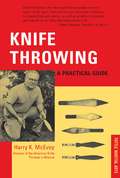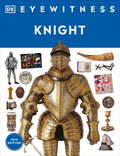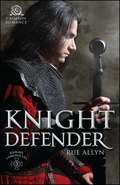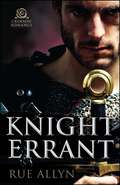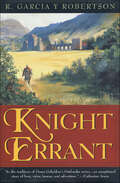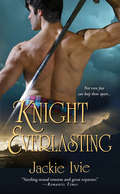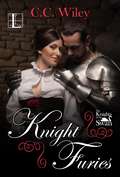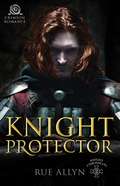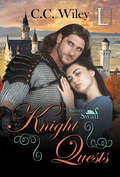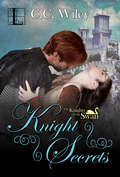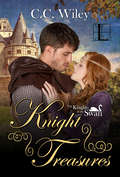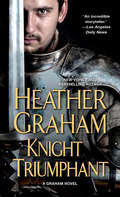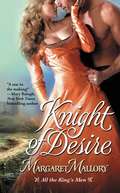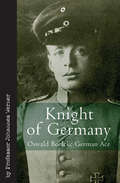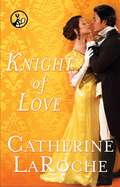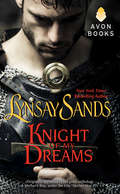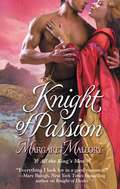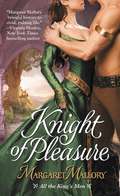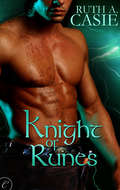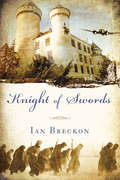- Table View
- List View
Knife Throwing
by Harry K. McevoyA concise, informative book on "the sport of the pioneers". Knife Throwing includes beginning and advanced throwing techniques and covers everything from home practice to hunting methods with accurate instructions. Readers will learn how to hurl hatches, tomahawks, the Gurkha Kukri, Bowies, and other knives.
Knife Throwing
by Harry K. McevoyA concise, informative book on "the sport of the pioneers". Knife Throwing includes beginning and advanced throwing techniques and covers everything from home practice to hunting methods with accurate instructions. Readers will learn how to hurl hatches, tomahawks, the Gurkha Kukri, Bowies, and other knives.
Knight (DK Eyewitness)
by DKEnter the world of a medieval horseback warrior and learn what it takes to become a knight.Eyewitness Knight follows the journey of a knight in the making, from being a page or a squire at an early age undergoing rigorous training before making it to the ceremony of dubbing.Learn what knights wore into battle and enter a gallery of swords and other weapons that were an important part of a knight's armory. Ride along with these warriors on their horses that were used not only for wars but also while hunting and jousting. Explore the mighty castles and know how they were protected from the enemy during a siege. Meet manor lords and ladies and learn about the knightly code of conduct and the idea of chivalry.Great for projects or just for fun, learn everything you need to know about knights with DK Eyewitness.
Knight Defender
by Rue AllynSent alone to Scotland to wed a wild Scot and serve the needs of her father and her king, Lady Jessamyn intends to escape the marriage and train horses for the good sisters at a nearby nunnery. But her intended is not the wild, boorish monster she imagined - just Baron Raeb MacKai, a man struggling to provide the best for his clan. It could be surprisingly easy to surrender her heart to him, until she learns his plans involve deceiving her family and attacking the king's ship that bears her brother.Raeb is done watching everyone he loves live in poverty and despair. His betrothal to a wealthy English heiress will solve a decade of problems, and the Scots' secret plot to keep King Edward I from getting a foothold on their rugged coastline will secure his family's future. If he must deny himself the spirited woman who would warm his bed and his heart, so be it.Neither is willing to give an inch in this clash of loyalties, but can either defend their hearts?Sensuality Level: Sensual
Knight Defender
by Rue AllynSent alone to Scotland to wed a wild Scot and serve the needs of her father and her king, Lady Jessamyn intends to escape the marriage and train horses for the good sisters at a nearby nunnery. But her intended is not the wild, boorish monster she imagined--just Baron Raeb MacKai, a man struggling to provide the best for his clan. It could be surprisingly easy to surrender her heart to him, until she learns his plans involve deceiving her family and attacking the king's ship that bears her brother.Raeb is done watching everyone he loves live in poverty and despair. His betrothal to a wealthy English heiress will solve a decade of problems, and the Scots' secret plot to keep King Edward I from getting a foothold on their rugged coastline will secure his family's future. If he must deny himself the spirited woman who would warm his bed and his heart, so be it.Neither is willing to give an inch in this clash of loyalties, but can either defend their hearts?Sensuality Level: Sensual
Knight Defender
by Rue AllynSent alone to Scotland to wed a wild Scot and serve the needs of her father and her king, Lady Jessamyn intends to escape the marriage and train horses for the good sisters at a nearby nunnery. But her intended is not the wild, boorish monster she imagined--just Baron Raeb MacKai, a man struggling to provide the best for his clan. It could be surprisingly easy to surrender her heart to him, until she learns his plans involve deceiving her family and attacking the king's ship that bears her brother.Raeb is done watching everyone he loves live in poverty and despair. His betrothal to a wealthy English heiress will solve a decade of problems, and the Scots' secret plot to keep King Edward I from getting a foothold on their rugged coastline will secure his family's future. If he must deny himself the spirited woman who would warm his bed and his heart, so be it.Neither is willing to give an inch in this clash of loyalties, but can either defend their hearts?Sensuality Level: Sensual
Knight Errant
by Rue AllynLady Juliana Verault gladly left England--and its men--far behind in her quest to live as a Beguine. <P><P>But the Christian community ceases to provide a safe haven when she's called to travel to Palermo, Italy, where she's entrusted with a letter from the pope that could radically change the church's stance on women. Juliana holds the key to upending the power structure throughout Europe, but only if she can dodge her cousin, King Edward I of England, and his plans to marry her off as political leverage. <P><P>Edward sets Sir Robert Clarwyn, a knight errant and loyal hunter of criminals and traitors, on Juliana's trail to retrieve her. Robert has never failed to bring home his target before...but then, he has never encountered a quarry like Lady Juliana, who can befuddle and bemuse him with just a smile. <P><P>If he can't find a way to compel her to return to England, he'll lose any chance of regaining his family lands and redeeming his heritage. Yet Juliana must complete her mission or risk endangering her gender's future in the faith. <P><P>With danger and intrigue mounting, Robert and Juliana must rely on each other and be willing to risk everything...including their hearts.Sensuality Level: Sensual
Knight Errant (War of the Roses #1)
by R. Garcia y RobertsonR. Garcia y Robertson is the author of a numerous of books and stories, many of them published in the SF genre. In addition, he has written two highly praised novels outside that genre, American Woman, and The Spiral Dance ("A remarkably realistic historical fantasy."--Ellen Kushner, host of Song and Spirit, NPR). Now Garcia y Robertson returns with a powerful time-travel romance that reaches new imaginative heights.Robyn Stafford, a young American woman executive, has flown from Hollywood to England to surprise her lover on his birthday, only to find that he's married and his wife's giving the party. So she takes a few days off to recover from her outrage and dismay, traveling and hiking in England near the Welsh border. There she encounters a young man on horseback, wearing a sword, chain mail, and a surcoat, who identifies himself as Edward Plantagenet, Earl of March, and asks directions to a nearby abbey. He thinks it is the year 1459, is amazed by her working cell phone, and invites her to ride along, although at first he thought her a young boy wearing pants! Then his pursuers show up, and Edward and Robyn ride madly across the hills until he drops her off and gallops back to face his enemies. After he fights them off, he returns and invites her to come with him and be his lady. Then he rides away, into the distant past, to the age of the War of the Roses.And so Robyn Stafford must find a way to leave the world of today for the fifteenth century, where she will fall in love with a young knight, a prince who will be king. This is the first of three books in a sweeping historical romance. At the Publisher's request, this title is being sold without Digital Rights Management Software (DRM) applied.
Knight Everlasting
by Jackie IvieIn the heat of battle, a powerful Scottish laird takes a mysterious woman captive. . .His Powerful DesireWhen Aidan MacKetryck finds a flaxen-haired maid caught in the crosshairs of battle, he quickly saves her from certain death. But while Aidan expects gratitude, he is sorely disappointed--for the fiery lass makes it clear she wants nothing to do with him. . .Her Dangerous Secret Juliana D'Aubenville is in hiding from those who want her entire family to perish. Despite her attraction to the strikingly handsome Aidan, Juliana knows she must escape before her identity is revealed. The trouble is, Aidan refuses to let her go. . .Their Forbidden LoveWith each moment Aidan and Juliana are together, their desire becomes more enticing--and harder to resist. But just as Aidan tries to lay claim to Juliana once and for all, their darkest secrets are finally revealed--putting both their love and their lives in terrible danger. . ."Filled with magic and a love so deep it takes my breath away." --Romance Reader at Heart on Once Upon a Knight"Sizzling sexual tension and great repartee." --Romantic Times
Knight Furies (Knights of the Swan #4)
by C.C. WileyFor a Knight of the Swan, any mission might lead to fortune—but the chance for love comes once in a lifetime . . . Margaret Grace is the lady of Fletchers Landing, earning what she can as a beekeeper and mead maker, and playing a nerve-wracking game with the mercenaries who demand payment to ensure her village’s safety. When an unknown man appears on horseback one day, Meg knows she can’t trust him—especially when the dashing knight claims to be looking for fabled lost riches. But her desires are harder to control . . . Tormented by the memories of his imprisonment at the hands of a vicious mercenary, Sir Nathan Staves is glad to be abroad on a quest for His Majesty. His task promises the chance to recover a legendary lost bounty, but also throws him into the path of the beguiling Meg. Their breathtaking passion awakens just as a familiar danger does, forcing Nathan to decide which is the greater prize—an elusive treasure, or the love of a woman he will die to protect . . .
Knight Protector
by Rue AllynBlackmailed into marrying her family's enemy, then swiftly widowed by illness, Lady Sorcha Marr must take charge of a clan she hates as much as they hate her. But fate intervenes in the form of her husband's twin - the man who betrayed her and led to her downfall.Sir Colin Marr fled his Highland home in disgrace, believing he would never again see the woman he loved. Returning a decade later to root out Scottish traitors who have infiltrated his family stronghold, he must persuade Sorcha to set aside her hostility and treat him as her husband in his brother's place. He needs the cover not only to save Scotland but her inheritance his resentful clan would gladly confiscate.Has fate set them up to even an old score, or is it giving them a new shot at learning to trust . . . and love?Sensuality Level: Sensual
Knight Protector
by Rue AllynBlackmailed into marrying her family's enemy, then swiftly widowed by illness, Lady Sorcha Marr must take charge of a clan she hates as much as they hate her. But fate intervenes in the form of her husband's twin--the man who betrayed her and led to her downfall.Sir Colin Marr fled his Highland home in disgrace, believing he would never again see the woman he loved. Returning a decade later to root out Scottish traitors who have infiltrated his family stronghold, he must persuade Sorcha to set aside her hostility and treat him as her husband in his brother's place. He needs the cover not only to save Scotland but her inheritance his resentful clan would gladly confiscate.Has fate set them up to even an old score, or is it giving them a new shot at learning to trust...and love?Sensuality Level: Sensual
Knight Protector
by Rue AllynBlackmailed into marrying her family's enemy, then swiftly widowed by illness, Lady Sorcha Marr must take charge of a clan she hates as much as they hate her. But fate intervenes in the form of her husband's twin--the man who betrayed her and led to her downfall.Sir Colin Marr fled his Highland home in disgrace, believing he would never again see the woman he loved. Returning a decade later to root out Scottish traitors who have infiltrated his family stronghold, he must persuade Sorcha to set aside her hostility and treat him as her husband in his brother's place. He needs the cover not only to save Scotland but her inheritance his resentful clan would gladly confiscate.Has fate set them up to even an old score, or is it giving them a new shot at learning to trust...and love?Sensuality Level: Sensual
Knight Quests (Knights of the Swan #2)
by C.C. WileyFor a Knight of the Swan in 15th century England, falling for the enemy is an act of treason . . . Orphaned as a young girl, Brigitte de Marnier has learned to live by her instincts. Which doesn’t explain why she accepts protection from a soldier in the service of the enemy crown. But something about Drem Ap Dafydd has her leaning into his strength, and surrendering to his intoxicating kiss, even knowing he is duty bound to destroy her . . . As a newly appointed Knight of the Swan, Drem is eager to prove his allegiance to the English crown in the battle against France. But in his sheltering arms, beautiful Frenchwoman Brigitte arouses in him another instinct—to love, honor, and protect. Then Drem discovers his beloved has a price on her head and he must choose between his vow—and his heart’s desire . . .
Knight Secrets (Knights of the Swan #1)
by C.C. WileyFrom the author of Knight Dreams, after an army storms her castle, a medieval English Lady searches for help, only to be captured by a dashing knight. Sworn to protect the crown, a Knight of the Swan must never surrender—not even to love . . .England, 1415. Ordered never to leave the lonely tower on her family estate, Lady Clarice Margrave is suddenly set free when her home is plundered. Now she is determined to discover the truth behind her father's alleged treason. But an act of daring only propels her into a new prison, with the very knight who destroyed her home as her keeper. Sir Ranulf, Lord of Sedgewic, is ruthless in his inquisition, though there is a searing tenderness in his touch. Is it possible her bold jailor is the Red Wolf of whom her father spoke—and the one man she might be able to trust?As a knight, Ranulf never questions his troth, but his beautiful prisoner stirs his heart and mind like no other. Clarice is achingly vulnerable—and extremely closed-mouth about her possible ties to the plot against the king. Duty demands he keep his distance, though he yearns to take her to his bed and adore her until he discovers what lies within her heart. And he would—if he weren't in danger of losing his own . . .
Knight Treasures (Knights of the Swan #3)
by C.C. WileyIn 15th Century England, alliances can be deadly for a Knight of the Swan. Especially those made in the heat of passion… Fleeing for her life after a savage attack on her homeland, Lady Sabine of Clearmorrow finds sanctuary on the windswept shores of southern England, praying that her family reaches her before her foes. When Sir Darrick of Lockwood shows up in a swirl of raging wildfires, Sabine is not willing to trust the dark knight, though he may be her last hope. And when she learns of his urgent quest to locate his sister, she realizes she may be his, too… Lady Sabine is the last woman who saw his beloved sister alive, which is the only reason Darrick demands she join him on the perilous journey to bring Elizabeth home. But even as he shelters Sabine from their powerful enemies—and savors the sweet passion between them—he wonders if the brave beauty will bring him all that he desires, or draw him deeper into danger….
Knight Triumphant (The Graham Novels #4)
by Heather Graham"An incredible storyteller." --Los Angeles Daily NewsKnight Takes Pawn After her husband Afton, Lord of Langley, falls prey to a deadly plague, Englishwoman Igrainia finds herself a captive in her own castle. . .held hostage by Scottish warrior Eric Graham. To Graham, Igrainia is merely a political pawn, a pretty prize to dangle in front of the English king. But when the king refuses a trade--Igrainia for the wife of Scotland's ruler Robert the Bruce--Graham forces Igrainia to marry him. What Graham never expects is the desire that his strong-willed bride stirs in his soul. And when Igrainia discovers the true heart of the fearsome knight, her life--and loyalties--will never be the same...
Knight of Desire (All the King's Men #1)
by Margaret MalloryFEARLESS IN BATTLE. His surcoat still bloody from battle, William FitzAlan comes to claim the strategic borderlands granted to him by the king. One last prize awaits him at the castle gates: the lovely Lady Catherine Rayburn. TENDER IN BED. Catherine risked everything to spy for the crown. Her reward? Her lands are declared forfeit and she is given this choice: marry FitzAlan or be taken to the Tower. Catherine agrees to give her handsome new husband her body, but she's keeping secrets, and dare not give him her heart. As passion ignites and danger closes in, Catherine and William must learn to trust in each other to save their marriage, their land, and their very lives.
Knight of Germany: Oswald Boelcke German Ace (Vintage Aviation Library #Vol. 3)
by Johannes WernerThe story of the World War I fighter pilot the Red Baron himself sought to emulate . . .German air ace Oswald Boelcke was a national hero during World War I. He was the youngest captain in the German air force, decorated with the Pour le Mérite while still only a lieutenant, and credited with forty aerial victories at the time of his death.Becoming a pilot shortly before the outbreak of the war, Boelcke established his reputation on the Western front first in reconnaissance, then in scouts, before finally becoming the best known of the early German aces, along with Max Immelmann. After Immelmann’ s death, he was taken off flying and traveled to the Eastern front where he met a young pilot called Manfred von Richthofen. Transferred back to the Western Front in command of Jasta 2, he remembered von Richthofen when new small fighting units were formed and chose him as a pilot for his new Staffel. Boelcke was tragically killed in a flying accident during combat in October 1916, although not before the reputation of his unit, together with his own, had been firmly established forever.This absorbing biography was written with the blessing of Boelcke’s family. Professor Werner was given access to his letters and other papers, and presents here a rounded and fascinating portrait of a great airman and a remarkable soldier who became known as the father of the German Jagdflieger.This edition has been completely reoriginated while remaining faithful to the language of the time of its original translation from German in the 1930s.
Knight of Love
by Catherine LarocheIn this saucy romance, an English lady turns the damsel-in-distress tale on its head as she escapes her malicious fiancé and fights for both her life and that of the lustful rebel that has become her protector.Lady Lenora Trevelyan, a naïve yet stubborn young lady born to the highest noble houses of England and Germany, finds herself betrothed to the brutal Prince Kurt von Rotenburg-Gruselstadtcruelly. But after she is cruelly bruised and flogged by her fiancé, she decides to take the reins of her fate. In the midst of a German revolution, Lenora escapes Kurt's iron fist and embarks home to England. She quickly finds herself in the hands of a rebel group and their robust, gentle, and handsome leader, Wolfram von Wolfsbach und Ravensworth, the English Earl of Ravensworth. Lenora struggles to deny the passion she feels towards the frustratingly chivalrous Earl but her desire for him continues to bloom. Wolfram hungers nothing other than to fight for democracy and civil rights in uniting Germany and to protect what he assumes is his damsel in distress. Through nights of immeasurable pleasure, Lenora and Wolfram learn that their passion is no match for the revolutionary chaos that ensues. And when Lenora discovers that her protector's life is threatened, she must risk everything to save her Knight of Love.
Knight of My Dreams
by Lynsay SandsOriginally appeared in the print anthology A Mother's Way, under the title "Mother May I?"From New York Times and USA Today bestselling author Lynsay Sands comes a classic short story of a knight in need of a bride ...Lady Alice knows she is not the type to entice a man. She's too voluptuous, too intelligent, too strong minded. Why, she even reads! But then Jonathan, Earl of Fairley, arrives at court. Tall, dark and handsome, the knight is any woman's dream. And he has just been ordered by the king to find a bride ... and Alice is to help him!Jonathan has been evading his mother's matchmaking schemes for years, so why does she insist that Lady Alice isn't for him? Alice is only to aid in his search for a bride, yet Jonathan can't help but be distracted by her glorious hair--the color of a sunset--and a figure that is like a lush berry about to burst to full ripeness ... Has Jonathan fallen prey to love?
Knight of Passion (All the King's Men #3)
by Margaret MalloryRenowned beauty Lady Linnet is torn between two desires: revenge on those who destroyed her family or marriage to her childhood sweetheart Sir James Rayburn. One fateful night, she makes a misguided choice: she sacrifices Jamie's love for a chance at vengeance. Jamie Rayburn returns to England in search of a virtuous wife--only to find the lovely Linnet as bewitching as ever. Their reckless affair ignites anew, even hotter than before, although Jamie vows to never again trust her with his heart. Then just as Linnet begins to make amends, she's tempted by one last opportunity to settle old scores. But a final retribution could cost her Jamie's love - this time forever.
Knight of Pleasure (All the King's Men #2)
by Margaret MalloryTHE GREATEST PASSION. Lady Isobel Hume is an expert swordswoman who knows how to choose her battles. When the king asks her to wed a French nobleman to form a political alliance, she agrees. But that's before the devilishly charming Sir Stephen Carleton captures her heart--and tempts her to betray her betrothed, her king, and her country. IS WORTH THE GREATEST PERIL. Sir Stephen Carleton enjoys his many female admirers--until he dedicates himself to winning the lovely Isobel. So when a threat against the king leads Isobel into mortal danger, Stephen has a chance to prove that he is more than a knight of pleasure... and that love can conquer all.
Knight of Runes
by Ruth A. CasieEngland, 1605When Lord Arik, a druid knight, finds Rebeka Tyler wandering his lands without protection, he swears to keep her safe. But Rebeka can take care of herself. When Arik sees her clash with a group of attackers using a strange fighting style, he's intrigued. Rebeka is no ordinary seventeenth-century woman-she's travelled back from the year 2011, and she desperately wants to return to her own time. She poses as a scholar sent by the king to find out what's killing Arik's land. But as she works to decode the ancient runes that are the key to solving this mystery and sending her home, she finds herself drawn to the charismatic and powerful Arik. As Arik and Rebeka fall in love, someone in Arik's household schemes to keep them apart, and a dark druid with a grudge prepares his revenge. Soon Rebeka will have to decide whether to return to the future or trust Arik with the secret of her time travel and her heart. 92,000 words
Knight of Swords
by Ian BreckonWinter 1944: northern Italy is a battlefield, with Communist partisans locked in vicious conflict with the forces of Mussolini's fascist Republic of Salò. Brookes, a wounded fugitive, finds shelter in an isolated and decaying castle in the mountains, home to a reclusive nobleman and his family. But as he recovers his strength, he discovers that the inhabitants of the castle are not quite what they seem; he also realizes that they have no intention of letting him leave.Snowed in through the long winter, Brookes, the Barone, and his family are drawn into a complex game of power and seduction. And as the violent demands of the warring world outside the castle become ever more insistent, they face a final choice: a decision that will determine the living from the dead.Knight of Swords is a gripping tale of identity and illusion, of games played for the highest stakes amid the devastation of war. At the heart of its enthralling mystery lies a timeless story: one of loyalty and betrayal, humanity and conflict, and the redemptive power of love.
